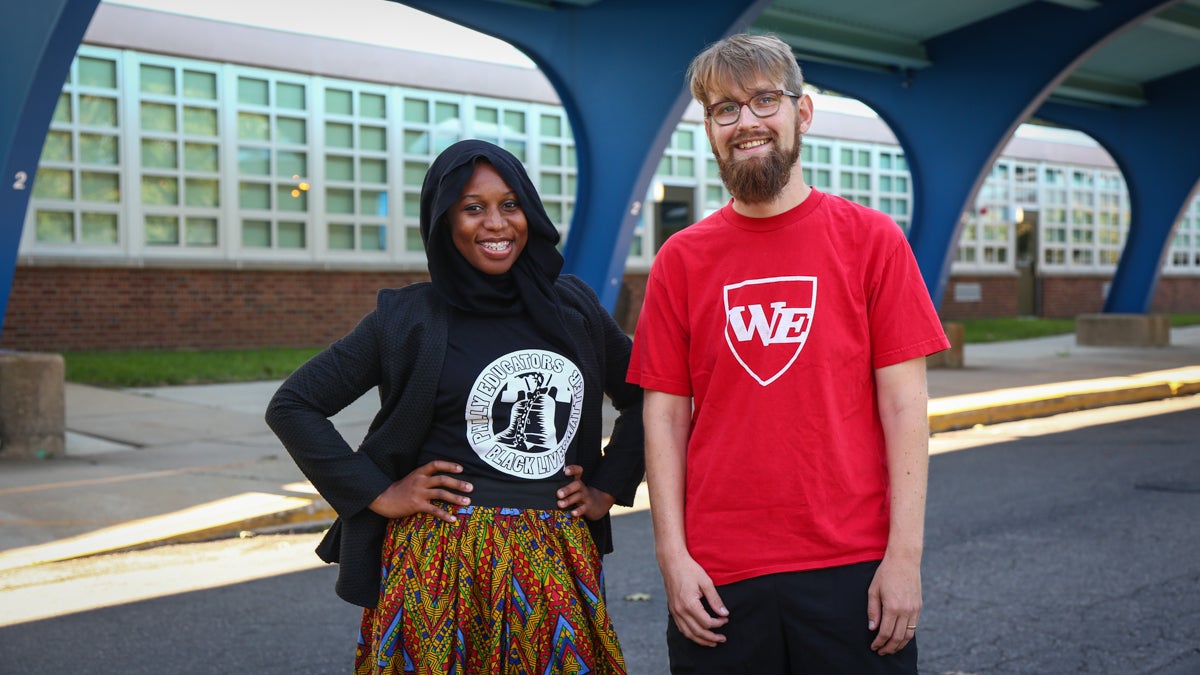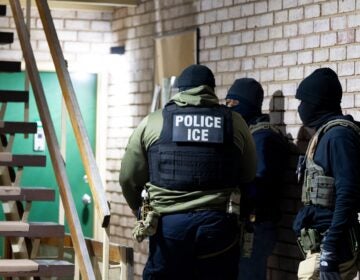How teachers can confront white supremacy in our classrooms, our schools, and ourselves

Keziah Ridgeway and Charlie McGeehan are teachers in the School District of Philadelphia who believe educators and students should confront white supremacy by talking about the racially charged events like the Ku Klux Klan rally in Charlottesville, Virginia. (Emily Cohen for NewsWorks)
Two weeks ago, we watched in horror as white supremacists rallied around a Confederate statue in Charlottesville, Virginia. We wish we could say that the behavior was shocking, but as history teachers, we know better.
“We are living through a very dangerous time …. To any citizen of this country who figures himself as responsible — and particularly those of you who deal with the minds and hearts of young people — be prepared to ‘go for broke.’”
Fifty-four years later, James Baldwin’s words still ring true. Two weeks ago, we watched in horror as white supremacists rallied around a Confederate statue in Charlottesville, Virginia, spewing racial epithets, and lashing out violently without feeling the need to hide their faces. President Trump then doubled down in his defense of them.
We wish we could say that the behavior was shocking, but as history teachers, we know better. We both teach in the School District of Philadelphia — Keziah is a black woman and Charlie is a white man.
Growing up in Philadelphia, Keziah remembers being keenly aware that her skin was brown and that made her different and less valuable to society. She later realized this was the effect of white supremacy.
Charlie grew up in Media, where he was never exposed to an educator of color from kindergarten through high school. While his high school was diverse, his “Level 1” classes had very few black and brown students. Whiteness brought the privilege of not being forced to address white supremacy until college.
Despite our different backgrounds and experiences, we both understand that there is no objectivity when it comes to white supremacy — deciding to say and do nothing is a political choice. For far too long, schools and educators have reinforced white supremacy as the status quo. As adults, it can be extremely difficult to make sense of the violence and hateful language from white supremacists in Charlottesville, but we need to realize that white supremacy in our society goes far deeper.
There are actions we can and must take now to confront it in our classrooms, in our schools, and in ourselves.
Talk about race in classrooms
Regardless of our subject area or grade level, we cannot be afraid to raise race, racism, and white supremacy as topics in our classrooms. For some, this isn’t easy, but there are resources to support us. By not raising these issues, we reinforce a status quo that oppresses many of our students.
We need to explore and define white supremacy with our students, and begin to deconstruct it, especially in History. Too often, history courses eliminate or obscure experiences and contributions of people of color. We contextualize black history as starting with enslavement, Native American history as starting with Columbus’ invasion. Young children are taught, implicitly and explicitly, that white people are the only ones with a rich history and therefore superior, normalizing oppression.
To help resist white supremacy in our curriculum design, we can acknowledge the same complexity in African and African-American individuals and societies as we do in those who are white. While schools often acknowledge figures like Dr. Martin Luther King, Jr., they are often only recognized as pollyanna figures of hope, rather than as the complex and radical figures that they truly were. Restricting King to “I have a dream” reinforces the status quo.
Even in math and science, teachers can discuss the Arabic, African, Native American, and Chinese origins of their respective subjects. As is too often the case, students are taught that the only respected sources of knowledge come from white people.
Philadelphia tries to address this by requiring African-American history as a course, and where it falls short, the Philadelphia Black History Collaborative is working to fill in the gaps. Primarily, they’ll focus on ensuring that black history is covered with a critical analysis of white supremacy.
Hire more people of color to teach our children
Besides teaching in anti-oppressive classrooms and curriculum, we need to address white supremacy in our schools. Black students in Philadelphia are 2.65 times more likely to be suspended than white peers, and 3.08 times more likely to be suspended multiple times. As educators, we must discuss the criminalization of black students (and not just boys), and actively work against reinforcing this white supremacist system in our classrooms.
Studies also show a sharp drop in disciplinary action when teachers look like their students. In Philadelphia, 67 percent of our educators are white, while we serve 86 percent students of color. From 2001 to 2011, the number of black educators in Philadelphia has declined by more than 18 percent. All Philadelphia educators can advocate for intentionally hiring and retaining black educators in our schools.
Confront your own racism and educate yourself
Most insidiously, white supremacy also manifests itself in our own minds, whether we are aware of it or not. Working to address this (often referred to as implicit bias) is important for educators regardless of race. For white Americans, confronting white supremacy must go deeper than simply proving we are less racist than our friends and colleagues. Jay Smooth aptly compares the work of being anti-racist to dental hygiene: It must be sustained over time.
White educators need to be willing to educate and challenge ourselves and each other, instead of constantly placing the burden of that work on people of color. Charlie has been working with fellow white educators to, explore their own racial identities and how it impacts our schools.
In Philadelphia, grassroots networks like Teacher Action Group and the Caucus of Working Educators have started this work, by beginning the process of creating affinity spaces for white educators and educators of color, and we hope to support the creation of these spaces in schools across our city.
Addressing what happened in Charlottesville with our students isn’t easy (there are resources to help!), but it is essential. How this looks will vary by our experiences and school contexts, but we have to at least show our students that we are willing to engage. And if you want to learn more, we will be co-facilitating a workshop on Sept. 13 on confronting white supremacy as educators and discussing concrete next steps.
When students enter our classrooms in the fall, we are both prepared to follow Baldwin’s advice and “go for broke” confronting white supremacy. Will you join us?
—
Keziah Ridgeway is a history educator at Northeast High School. Charlie McGeehan is a humanities educator at The U School. Both are active with Teacher Action Group and the Caucus of Working Educators.
WHYY is your source for fact-based, in-depth journalism and information. As a nonprofit organization, we rely on financial support from readers like you. Please give today.




